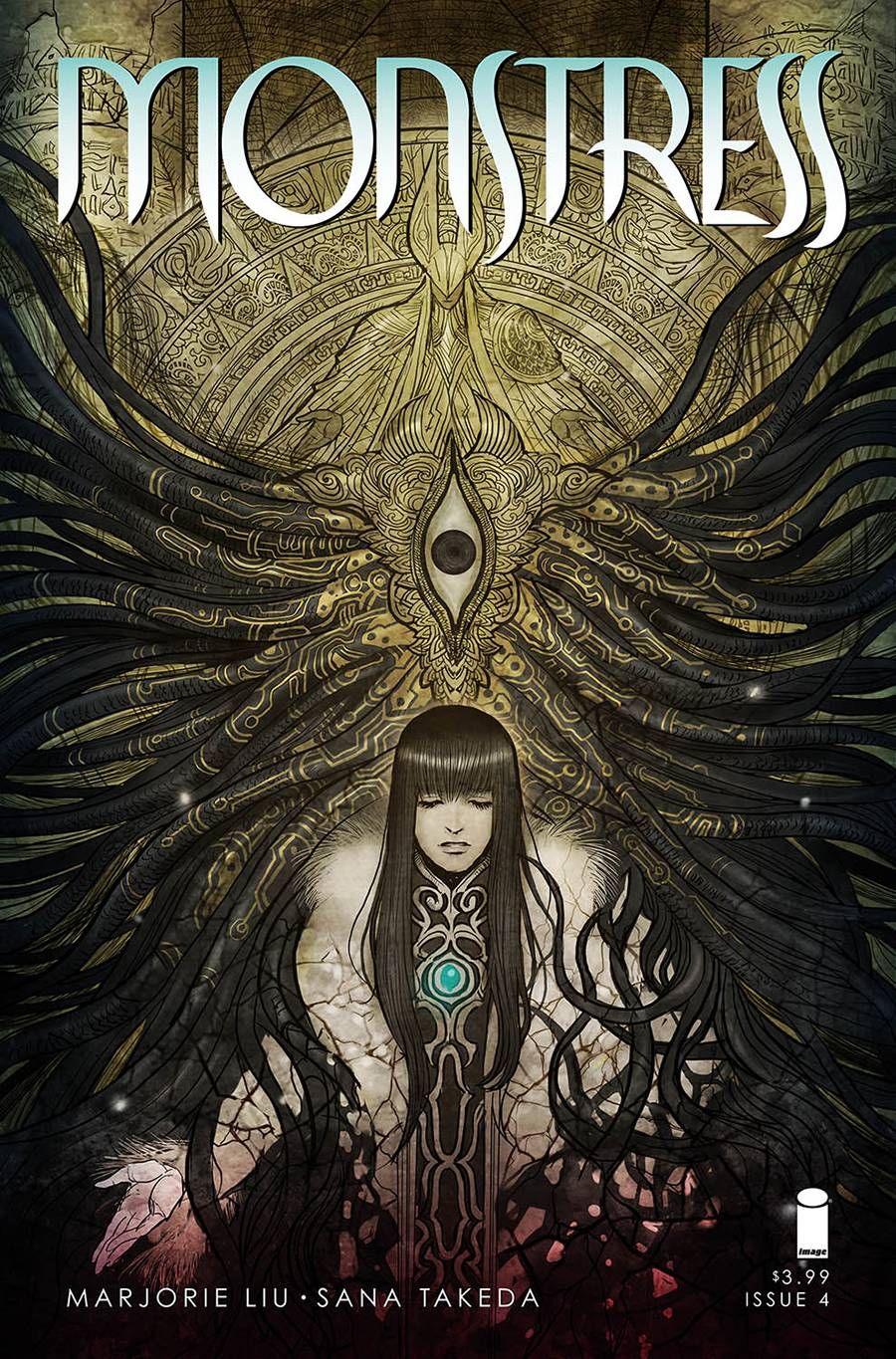Marjorie Liu and Sana Takeda's "Monstress" #4 opens with a bloody execution. Despite Takeda's solid perspective choices and action lines, this cinematic opening feels flat because it's an overused, manipulative way to grab the reader's attention, as the stakes and motivations of the characters are not yet known. However, the storytelling improves in both subtlety and ingenuity in later scenes.
Liu's exposition makes a point of avoiding information dumps, but one of the tradeoffs is that she often requires the reader to work harder. The second scene requires the reader to slow down and absorb the existence of and context for yet another set of characters, but it repays the reader's attention with rapid world building. Liu introduces the Queen of Wolves and her court, sketches out the position of the Dusk Court and reveals a secret about the fall of Constantine. The military calculations and courtly machinations feel real, and Takeda's lush details immediately give the setting and the characters stature and age.
Takeda's art also assists with characterization. Really, all the reader needs to know about the Queen and Alia the Warlord is in their faces. The Queen is calm, gentle and trusting, while Alia is merciless, angry and eager for power and revenge. Her true face is a surprise, and a sly conversational tidbit dropped by Aku, the Monkey King, reveals another piece of the puzzle. These revelations feel too staged and convenient, but they successfully link these new characters back to the primary plotline of Maika Halfwolf's search for answers.
The next scene has even more surprises. Liu and Takeda's narrative technique shifts and broadens as the point of view shifts to the Monstrum, the creature that now lives inside Maika's body. Liu creates a gravelly, slow rhythm of speech for the Monstrum by using pauses and ellipses, and the texture of the Monstrum's voice is further enhanced by Rus Wooton's white-on-dark teal lettering. The reader is pulled into the interior space where the Monstrum lives and thinks and feels. In a story in which most of the characters have endured and inflicted trauma, the pain of the Monstrum is unusually raw, perhaps because it carries its pain alone. To be awakened and to endure what is symbolically a second birth only seems to trigger loss and grief. The Monstrum talks to itself and to Maika, but its real audience is the reader. For the first time, the reader is aware the Monstrum isn't just a tool or a source of power or just a manifestation of Maika's emotions. It's a separate being, and -- despite its terrible hunger and destructive power -- it may even deserve sympathy.
Maika's tart dialogue and refusal to be cowed by the Monstrum's demands builds her character. She and the Monstrum may be reluctant roommates, but there's already a promising chemistry between them. It's funny when the Monstrum has no response to Maika's "Spit on that" line, and there's even more humor when Master Ren returns. Takeda's comic pacing and body language are excellent for the sequence in which Kippa hugs Ren. The visual gags are nothing new, but the humor breaks up the atmosphere of dread and suspense and lightens the mood. It's a clever move by Liu, and the splendor of the cliffhanger that follows is more powerful because the grip of tension slackened for just a few moments.
Liu and Takeda are still building a sprawling fantasy epic, but their approach in "Monstress" #4 has already hit a great balance between the personal and the political. Maika's struggle with the Monstrum is both visceral and moral; she is battling for control of both her body and her soul. Artfully, the disagreement between the Queen of Wolves and Alia is also one of both sovereignty and principles. The war between the Cumaea, the Federation and the Arcanic Lands are linked to Maika's quest by themes of identity, trust and compromise, deceit and revenge.

